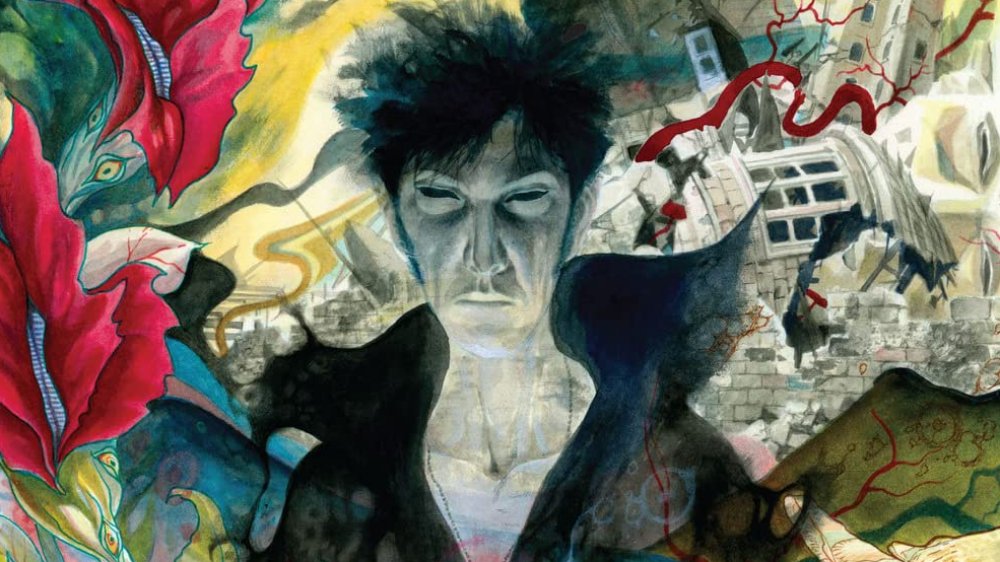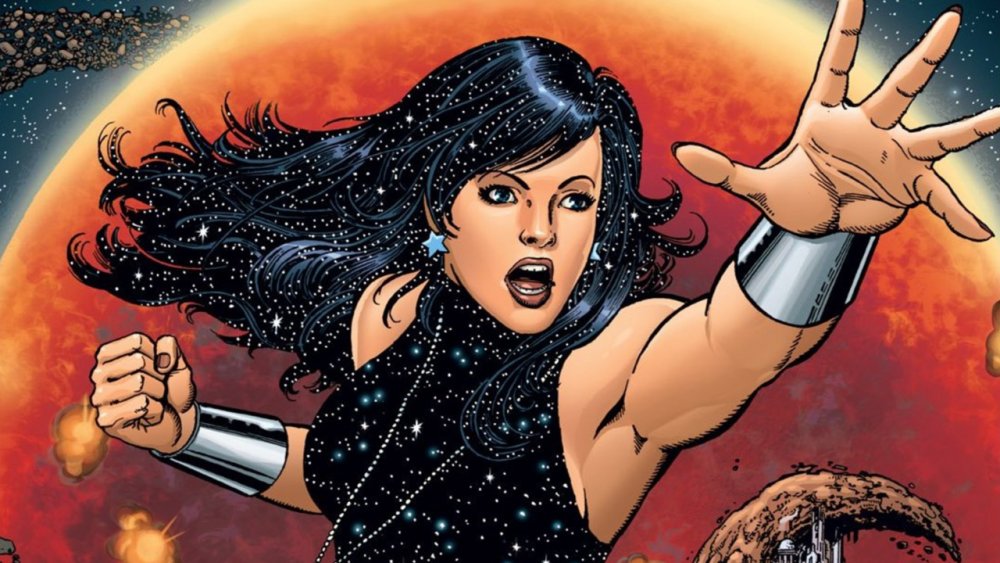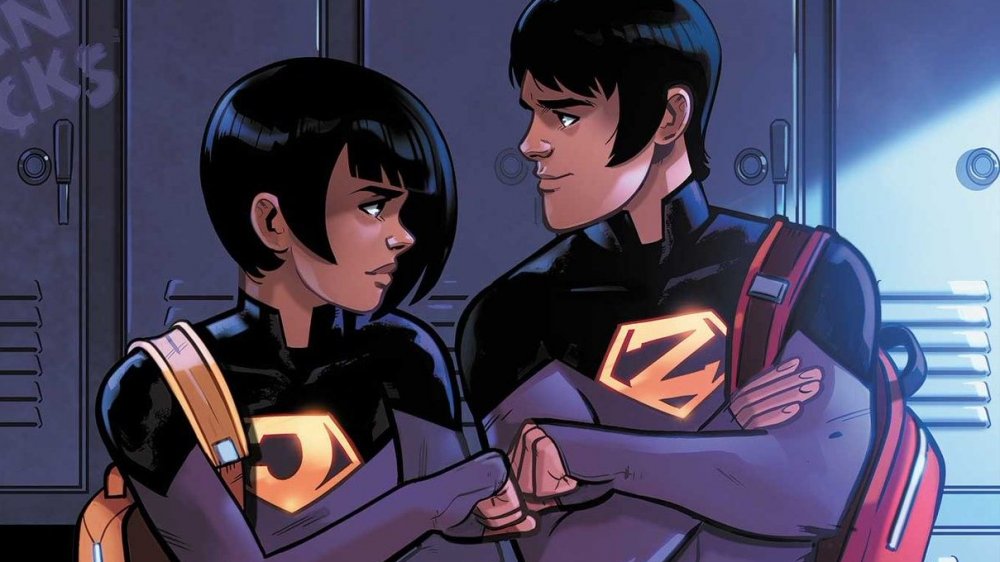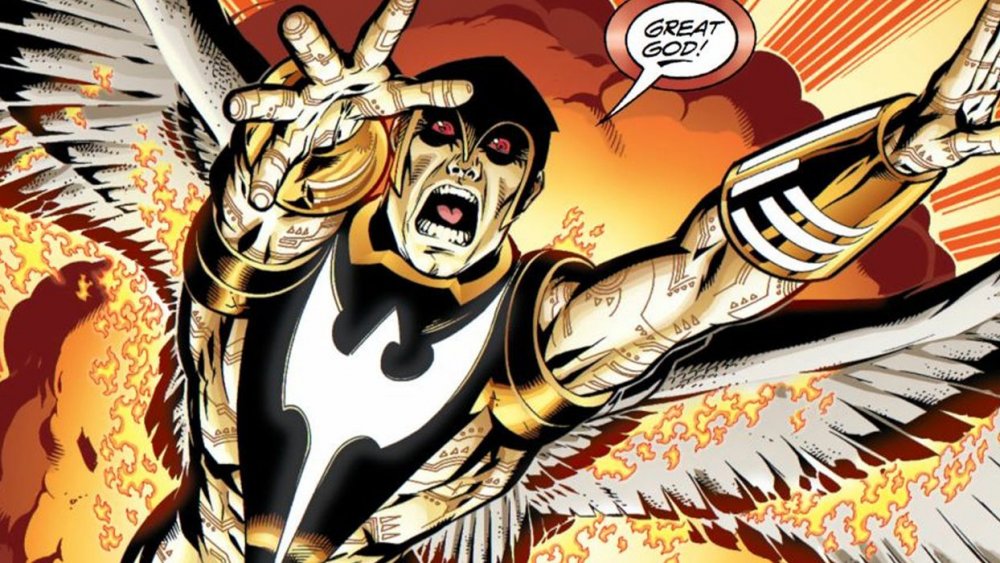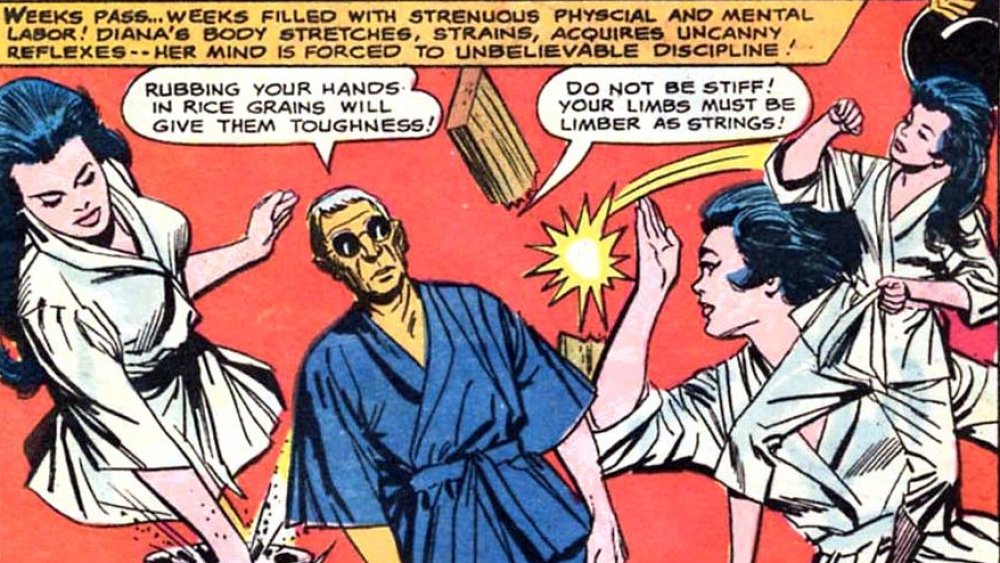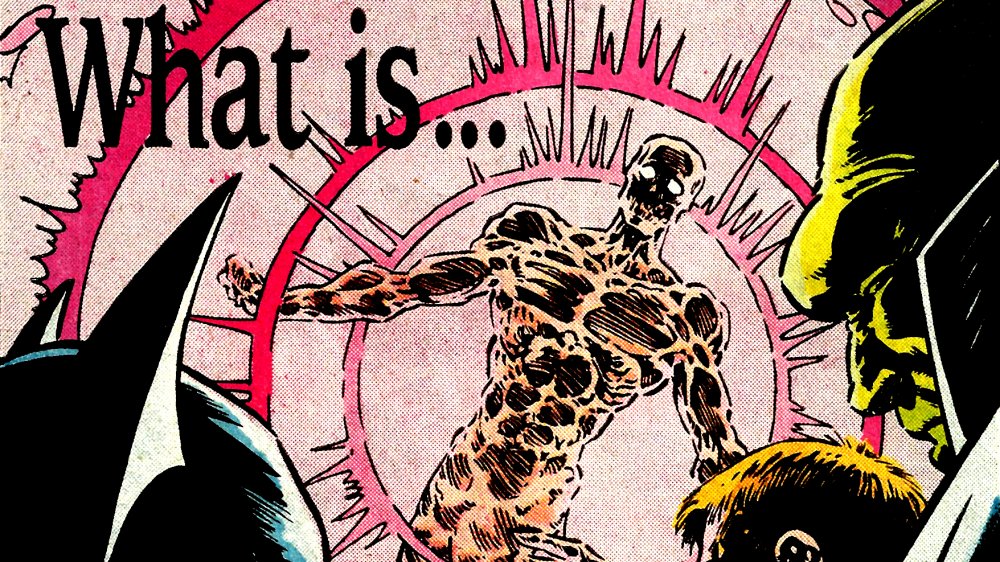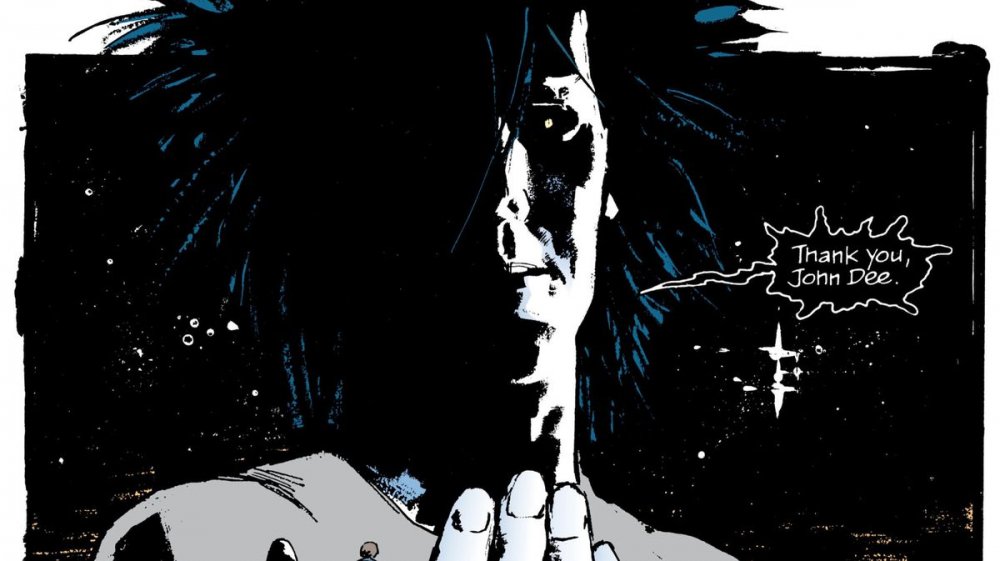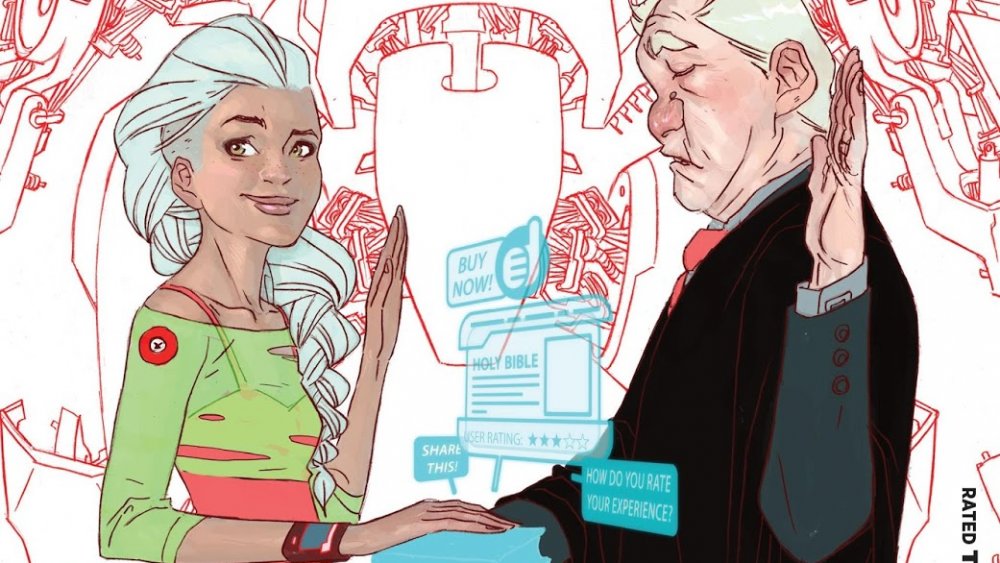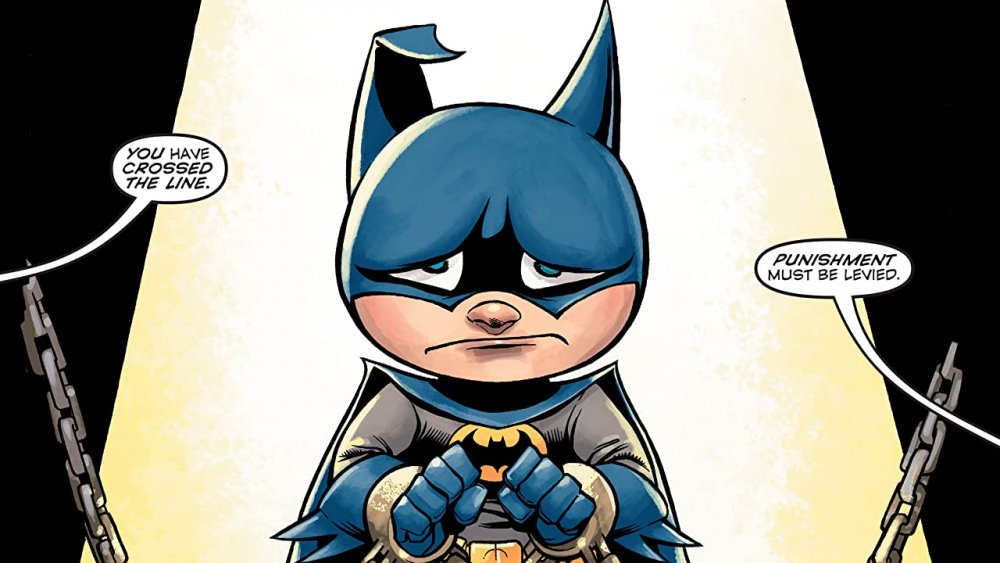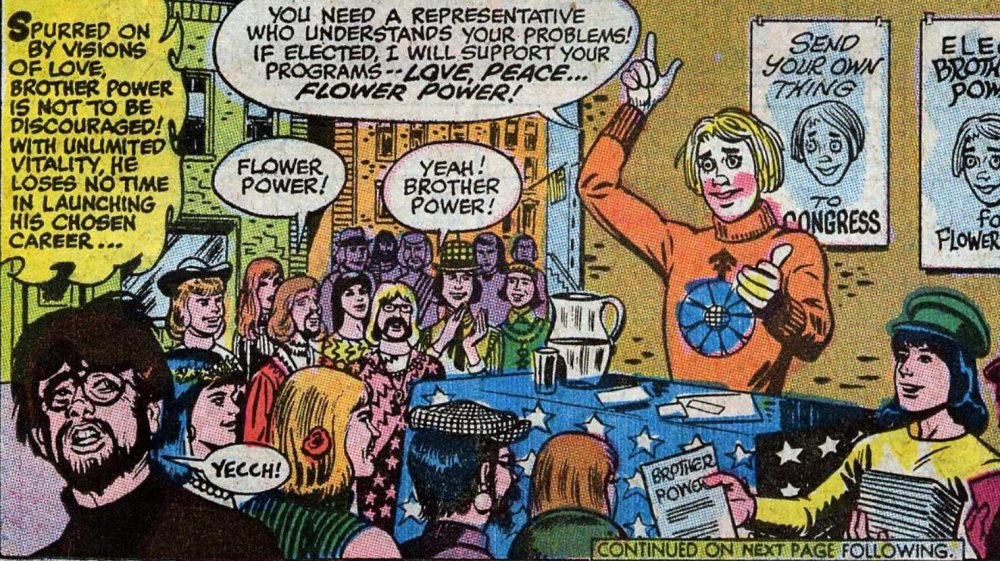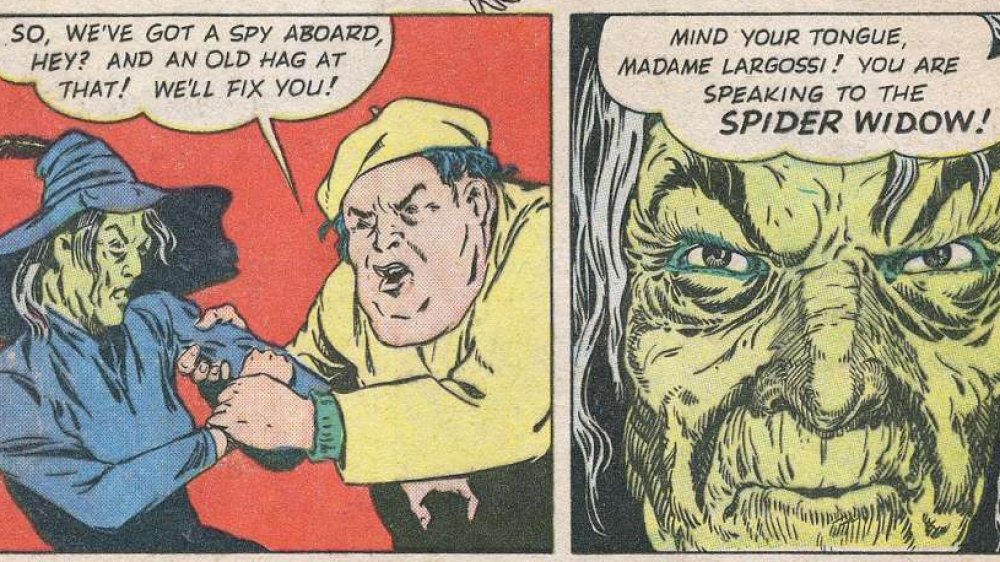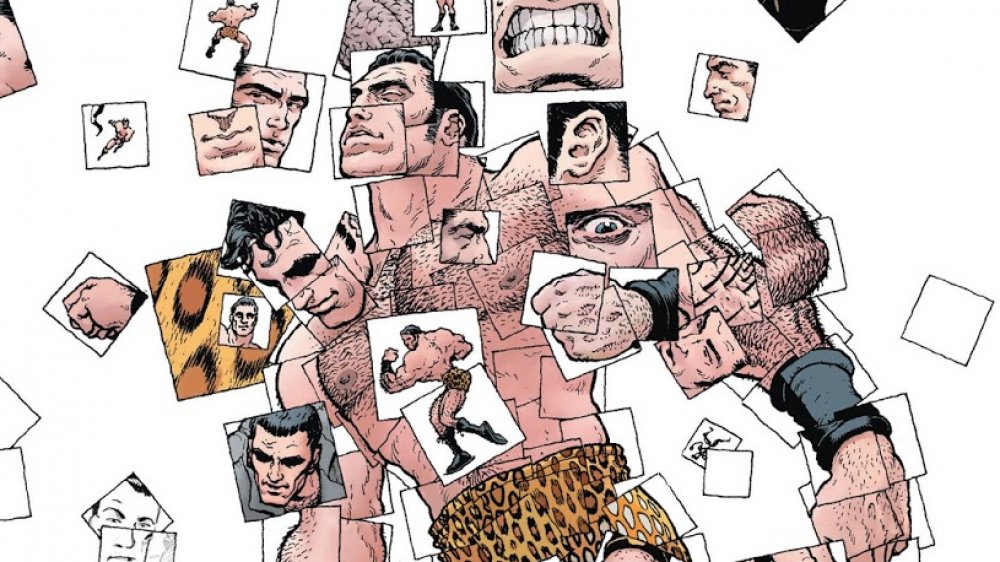The Real Reason We Haven't Seen These DC Characters In The DCEU Yet
It's a good time to be a DC fan. Wonder Woman has millions flocking to the movie theater, eager to take the concept of an invisible jet seriously. Harley Quinn made the whole world crave the perfect breakfast sandwich. Joker inspired such adulation that it made a public staircase famous. Anything seems possible in this moment. Well ... almost anything.
Far be it from us to deny anyone a well-earned victory lap, but consider how huge the DC universe is. Thousands of characters have come and gone over the decades, and despite the DCEU's success, most of them will never make a cinematic appearance. Some of these omissions make sense — few are clamoring for a Matter-Eater Lad movie, after all — but some are more surprising. We're here to examine those DC characters who aren't yet part of the DCEU and break down why they've yet to grace the silver screen.
We might never know Donna Troy
In 1984, New Teen Titans #38 asked a crucial question: "Who is Donna Troy?" This issue aimed to be the definitive origin of the Amazon known as Wonder Girl, because Great Hera, did she need one. Donna began as a post-war attempt to soften Wonder Woman's image. Originally, Wonder Girl was just Diana, only younger. Somewhere along the way, however, she became presented as a separate character entirely. New Teen Titans attempted to rewrite her as an orphan, taken to Themyscira and raised as Diana's little sister. Simple enough, right?
Wrong. Line-wide events have snarled Donna Troy's storyline into an ever more tightly knotted tangle of explanation. Post-Crisis on Infinite Earths, Donna became a "Titan Seed," rescued by the mythical Rhea. Then came a reboot that re-imagined her as a magical duplicate of Diana, created by an Amazon sorceress. The New 52 introduced a Donna who, upon death, replaced the Fates in the Greek pantheon ... only for this to be erased by the DC Rebirth initiative. Currently, she's a magical Diana-double, created for evil and full of false memories of having been an orphan.
This maelstrom of explanations and counter-explanations has made Donna an intimidating candidate for adaptation. She's a longtime part of Wonder Woman's corner of the DC universe, sure, but so are Etta Candy, Paula von Gunther, and Julia Kapatelis, and they don't require an hour's worth of Googling to grasp. Who is Donna Troy? Moviegoers aren't likely to find out any time soon.
The Wonder Twins aren't well-known enough for the DCEU
It's easy to roll one's eyes at the Wonder Twins. They're retro, goofy, and full of catchphrases. But seriously, Jayna and Zan are ludicrously strong heroes. Jayna can transform into any animal, including mythological creatures, alien beasts, and infinitesimal insects. Zan can transform into water at any state, and we mean any. Super Friends sees him become a blizzard, a frost giant, and liquid nitrogen, in addition to the utterly insane range of things he can approximate as ice. Complex machinery? Enormous, unbreakable cages? Both are well within his frozen wheelhouse. Zan can pretty much became any material object. Kindly stow your "form of: a bucket of water!" jokes.
Honestly, the denizens of the DC universe are lucky the Wonder Twins haven't decided to take over the world. Moreover, their career in the comics expands far beyond their cartoon capers, with a 2019 maxi-series garnering an impressive amount of critical and commercial success. So why won't the Wonder Twins be taking to the big screen any time soon? Well, think about it. Did you know the details of their formidable powers and recently successful storylines before this paragraph? No, you likely knew them as the goofy Super Friends kids with the dumb pet monkey. Kids aren't clamoring for Jayna and Zan, and few adults remember them fondly enough to want them in the DCEU. A shout-out is possible, but don't hold your breath for anything more.
Zauriel would cause a lot of controversy for the DCEU
Zauriel is an immensely powerful member of the Justice League. He's, first off, immortal, already having lived for millions of years. Moreover, he's tapped into the energy of all living things, and as such, can communicate with animals and sense good and evil. When it comes to more mundane superpowers, he's no slouch, either. Zauriel can fly, carries a flaming sword of elemental power, and can emit a sonic scream. Oh, and he can part bodies of water using "the 'Red Sea trick.'" Because he's a literal, biblical angel.
Zauriel was originally intended to be a re-imagining of Hawkman, which DC nixed. Thus, his story became something altogether stranger. Zauriel was once a member of the Eagle Host, an elite squad of angels who serve "the Presence," aka God. Zauriel has spent eons protecting the souls of valiant women — one of whom he falls in love with. And that's when a separate group of angels decides to go rogue and attempt to accomplish what Lucifer failed at so many millennia ago.
It's fascinating stuff that would open up all kinds of interesting storytelling avenues for the DCEU — how familiar are Wonder Woman's gods with the Abrahamic host? — but also entire barrels' full of worms. Introducing actual, biblical characters, a hair's breadth away from the God billions worship, is pretty much asking for trouble. Alas, Zauriel is likely to stick to the comics where he remains the most interesting magical expert the JLA ever had.
I Ching is the kind of character best left behind
I Ching (yes, like the ancient Chinese text) is part of a strange era in Wonder Woman's history. Back in the late 1960s, DC introduced a wildly new take on the Amazon princess, more of a spy than a conventional superhero. Stripped of her powers, she opened up a mod boutique, traded her star-spangled one-piece for a series of sleek catsuits, and met I Ching, the last living member of an ancient sect of warrior monks. I Ching tutored Diana in martial arts, honing her humble human form into a sleek, living weapon. Anything and everything was on the table for this reboot, thus Diana Prince gained Emma Peel's wardrobe, Doctor Strange's mentor, and James Bond's groovy iconography.
I Ching is the sort of figure the DCEU lacks. Mentors are thin on the ground, traditional martial artists even scarcer. So why won't we be seeing him in the movies any time soon? For one thing, this era isn't exactly beloved, and famous feminist and activist Gloria Steinem, a passionate Wonder Woman fan, infamously criticized it in Ms. Magazine. Moreover, I Ching is the sort of moldy, racist stock character best left behind. Consider his name. It's like someone creating a mysterious Anglophone character named Canterbury Tales. If DC wants to include some Asian representation in the DCEU, they're a whole lot more likely to look at characters Grace Choi or Kong Kenan, the Superman of China — for good reason.
The Weird is too godlike for his own good
The Weird is, as you might've guessed, pretty darn weird. A being of pure energy, the Weird hails from an alternate dimension where his people are exploited as fuel. When a rift between worlds is opened, he seizes his chance and flees to Earth. There, he possesses the body of a dead man, a process that mingles the Weird's personality with the corpse's and endows him with tremendous abilities. The Weird has mysterious power over energy, matter, and magnetism. He's breathtakingly strong, capable of altering his own density, and able to manipulate energy to the point of altering brain waves. He is, frankly, godlike in his abilities.
In this, the Weird begs to be brought to the big screen. He's flexible enough to be molded to whatever movie he's brought into, yet he's characteristic enough to be worth adapting in the first place. Plus, he's a creation of comic heavyweights Jim Starlin and Bernie Wrightson, the minds behind Swamp Thing, Thanos, and Shang-Chi. But enormous power brings enormous problems for DCEU storytellers. How, exactly, do you incapacitate someone like the Weird? Does a violent conflict exist that he couldn't stop in seconds? In Watchmen's wake, superhero fans are well-acquainted, via Doctor Manhattan, with the reality of power-sets like the Weird's. He breaks the rules of energy, but unfortunately, also the rules of storytelling.
Dream might never get his own movie
The Sandman is a classic comic for good reason. Its characters — in particular, Dream, the titular "prince of stories" — are fascinating, and they provide endless avenues for adventure, romance, and lamentation. Dream himself has been around for millennia, and he's at once unreachably ancient and deeply human. He's a brooding god as much as he's a squalling sibling, being chided by his sister who just so happens to be Death. Sandman is an icon of the 1990s, goth culture, fantasy fiction, and Neil Gaiman's enormous oeuvre. Frankly, it's shocking that a movie doesn't yet exist.
But it doesn't ... and therein lies the problem. Sandman adaptations have been floundering for decades, the latest attempt having begun a decade ago. Currently, Sandman is said to be headed for Netflix, with Allan Heinberg attached as showrunner. Regardless of whether or not that happens, it'll mean the DCEU is even less likely to incorporate Dream any time soon. If it goes through, he might very well be confined to the Netflix series, and if it doesn't, like so many Sandman adaptations before it, it'll make the prospect even more intimidating. Dream might be one of the Endless, but as for now, his powers don't extend to the silver screen.
Prez might be too political for the DCEU
A creation of the 1970s, Prez is youth culture incarnate, but that doesn't mean he's some one-trick pony. No, Prez has lasted long beyond his groovy era, growing into one of the most genuinely fascinating denizens of the DC universe. An issue of Sandman saw him make his first appearance in the 1990s, which spurred a 1995 Vertigo Visions one-shot. Then, a 2015 series reimagined Prez as Beth Ross, a teen girl who's unwittingly elected president via Twitter. This take is a brilliantly acidic one. Beth inhabits the US of 2036, in which people compete for healthcare via game show, and the world's richest man has purchased the entire state of Delaware.
Prez, in short, has everything a candidate for the DCEU needs — strong aesthetics, unique abilities, and a niche no one else fills. Unfortunately, Prez requires a very particular context to function. So far, s/he's thrived ... in the confines of the 1970s, the DC universe of the future, and the trippy environs of Vertigo comics. The DCEU, as it exists, is flexible, but it's not quite that flexible. Moreover, Prez is an inherently political character. The DCEU is no stranger to politics — Lex Luthor is a walking, talking indictment of billionaire wunderkinds as thought leaders — but Prez tends to take on hot button issues specifically, whether that's drone warfare in the 2015 series or the George H. W. Bush administration literally giving the character brain cancer in the Vertigo Visions one-shot.
Bat-Mite ... you either love 'em or hate 'em
Batman is the Dark Knight, the Caped Crusader, the hero Gotham deserves. Bat-Mite, a floating imp in a baggy costume, doesn't really fit that fearsome image. Yet the creature from the "Mite Dimension" has been part of Batman's story since 1959. A quirky troublemaker, he's most often compared to Superman's foe, Mr. Mxyzptlk, except that Bat-Mite never really menaces Batman all that forcefully. He's more of a fanboy than anything else, and he generally leaves of his own accord once he realizes he's annoyed his idol.
Bat-Mite might seem like a vestige of a simpler time, but he's very much a part of modern continuity. In fact, 2015 saw him gain his own six-issue miniseries. Believe it or not, he can even function in a grim context, as 2008 debuted a Bat-Mite who acts as a traumatized Batman's last vestiges of rationality. Seems like he'd be able to function in the DCEU, right? Wrong. For all Bat-Mite's durability, he's always been a controversial character, one who's just as marked by editorial decisions to ax him as he is by spirited attempts to bring him back. It takes a writer as respected as Grant Morrison to introduce him into a serious scene, and even then, only as a shout-out. Few would be willing to do the work necessary to make him work on the silver screen. Bat-Mite seems likely to remain a creature of the comics, where he can pop up now and again to inject a little silliness into his idol's world.
Brother Power the Geek is the ultimate hippie hero
It's probably already clear to you why a character known as Brother Power the Geek won't be making an appearance in the DCEU any time soon. He's bizarre from the ground up and, believe it or not, something of a shameless rip-off. Brother Power was DC's attempt at a Silver Surfer, who, back in 1968, had become a hit with college kids. Like the Surfer, Brother Power is a wandering brooder. Unlike the Surfer, he's a mannequin zapped into life by lightning. DC only produced two issues of his adventures, though Brother Power has snuck his way back into the comics time and time again, most prominently in Neil Gaiman's Swamp Thing Annual #5.
Brother Power is, obviously, strange — too strange, probably, for the DCEU. But strangeness isn't the only obstacle (Rocket Raccoon is, after all, an international icon). No, Brother Power's big problem is his hippie-ish nature. Everything about the character is straight out of the 1960s, to the point that intra-DC dislike of hippie culture is what kept the character confined to two issues. Nowadays, his 1960s affectations are more goofy than controversial ... but that's its own problem. There's no good solution here. Either the DCEU would have to update him into some sort of Gen Z equivalent, which would leave everyone embarrassed, or accept him as an accidentally hilarious relic of the Age of Aquarius. Neither seems likely to entice the powers that be.
Nobody knows about Spider Widow, The Clock, and other Quality Comics characters
The Golden Age of comics produced plenty of publishing houses you've likely never heard of. Consider Quality Comics, whose titles and characters were bought by DC in 1956. Some Quality creations established deep roots in DC, including Plastic Man and the Blackhawks, but most have fallen into obscurity. This is a tremendous shame, as many of Quality's superheroes are insanely cool.
Consider the Clock, who wears a tuxedo and leaves villains with monogrammed calling cards bearing pithy messages. Or how about Spider Widow, a beautiful debutante with the power to control black widow spiders and who dresses up like a Halloween crone to terrorize ne'er-do-wells as "the Grandmother of Terror?" Or the Human Bomb, capable of blowing things up at the slightest touch, to the point that he must live within a containment suit? Some of these characters pop up now and again as shout-outs in niche titles, but they feel more like attempts to stave off public domain status than anything else. Consider what actually committing to these stories would accomplish. The Human Bomb has a Mr. Freeze-style conflict at the core of his very nature. The Spider Widow still stands alone as a female power fantasy of wild crone-hood. And honestly, does the Clock — with the tuxedo, the cards, and the puns — need any further justification? These are characters meant for the silver screen ... if only someone would give them the chance.
Flex Mentallo is incredibly buff ... and way too bonkers for the DCEU
Flex Mentallo is "The Man of Muscle Mystery." What is muscle mystery? Well, it's the sort of power that makes Flex capable of defusing a bomb by clenching his bicep. Flex is a creation of the notoriously meta-textural Grant Morrison and Richard Case, who were, in this case, parodying Charles Atlas' infamous comic ads. His eponymous comic is as much a story of superheroism as it is a commentary on comic book fandom. Our bad guy, who's also our good guy, redeems himself by reckoning with his geeky adolescence. He spirals into self-recrimination, but he's ultimately saved by Flex, blithe and buff as ever, telling him to "gamble a stamp" on the chance to "be a real man." It's dizzying and niche as all get-out and all the more beloved for it.
But everything that makes Flex Mentallo who he is also makes him borderline unfilmable. Doom Patrol pulls it off, but that's because Doom Patrol is openly bonkers. It knows it's weird, and so it can feature scenes where Flex makes tulips grow by rippling his quads. But Flex can exist in no other context. The DCEU might gesture now and then towards allegory and critique of the nature of superheroes as fictional constructs, but Flex's very nature demands a viewer who can recognize something like "Charles Atlas parody" on sight. Watered down, he's just a musclebound do-gooder. The DCEU doesn't really need another one of those, but hey, at least a DC webseries does.
